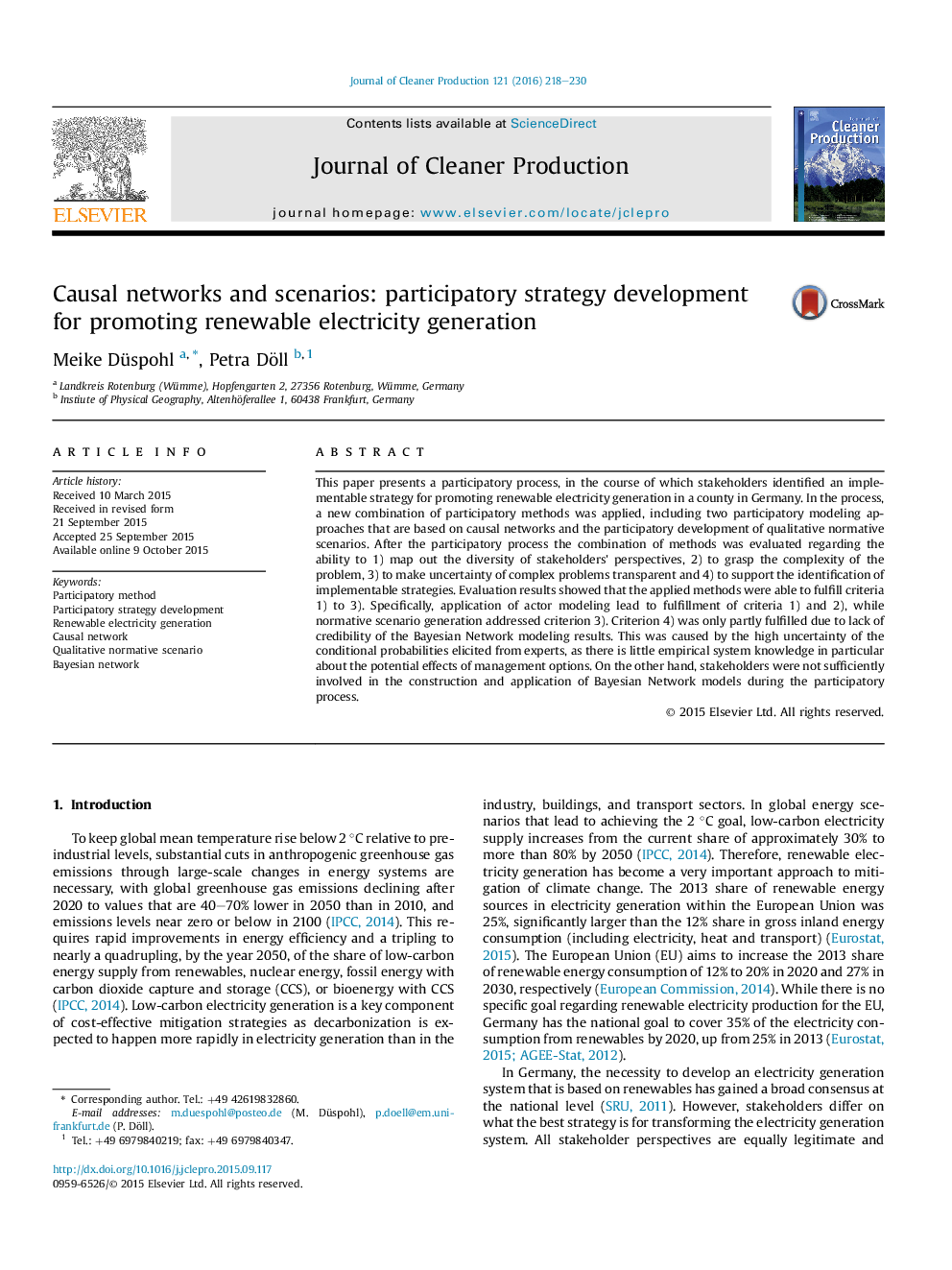| کد مقاله | کد نشریه | سال انتشار | مقاله انگلیسی | نسخه تمام متن |
|---|---|---|---|---|
| 1744171 | 1522128 | 2016 | 13 صفحه PDF | دانلود رایگان |
عنوان انگلیسی مقاله ISI
Causal networks and scenarios: participatory strategy development for promoting renewable electricity generation
ترجمه فارسی عنوان
شبکه ها و سناریوهای علمی: توسعه استراتژی مشارکتی برای ترویج تولید برق تجدید پذیر
دانلود مقاله + سفارش ترجمه
دانلود مقاله ISI انگلیسی
رایگان برای ایرانیان
کلمات کلیدی
روش مشارکتی، توسعه استراتژیک مشارکتی، تولید برق قابل تجدید، شبکه علمی سناریوی هنجاری کیفی، شبکه بیزی،
ترجمه چکیده
این مقاله فرایند مشارکتی را ارائه می دهد که طی آن ذینفعان یک استراتژی قابل اجرا برای ارتقای تولید برق تجدید پذیر در یک شهرستان در آلمان را مشخص کردند. در این فرآیند، یک روش جدید از روش های مشارکتی اعمال شد، از جمله دو روش مدل سازی مشارکتی که مبتنی بر شبکه های علی و توسعه مشارکتی سناریو های قانونی کیفی است. پس از فرآیند مشارکتی ترکیبی از روش ها در رابطه با توانایی 1) ارزیابی تنوع دیدگاه ذینفعان، 2) درک پیچیدگی مشکل، 3) عدم قطعیت مشکلات پیچیده شفاف و 4) پشتیبانی از شناسایی استراتژی های قابل اجرا نتایج ارزیابی نشان داد که روش های کاربردی قادر به انجام معیارهای 1 تا 3 می باشند. به طور خاص، استفاده از مدل سازی بازیگر منجر به اجرای معیارهای 1 و 2 می شود، در حالی که تولید سناریوی هنجاری معیار 3 را مطرح می کند. معیار 4) به علت فقدان اعتبار نتایج مدل سازی شبکه بیزی، تنها تا حدی برآورده شد. این ناشی از عدم اطمینان بالقوه احتمال احتمالی ناشی از کارشناسان است، زیرا دانش سیستم تجربی کمی در خصوص اثرات بالقوه گزینه های مدیریت وجود دارد. از سوی دیگر، ذینفعان در ساخت و استفاده از مدل شبکه بیزی در طول فرایند مشارکتی به اندازه کافی درگیر نگردیدند.
موضوعات مرتبط
مهندسی و علوم پایه
مهندسی انرژی
انرژی های تجدید پذیر، توسعه پایدار و محیط زیست
چکیده انگلیسی
This paper presents a participatory process, in the course of which stakeholders identified an implementable strategy for promoting renewable electricity generation in a county in Germany. In the process, a new combination of participatory methods was applied, including two participatory modeling approaches that are based on causal networks and the participatory development of qualitative normative scenarios. After the participatory process the combination of methods was evaluated regarding the ability to 1) map out the diversity of stakeholders' perspectives, 2) to grasp the complexity of the problem, 3) to make uncertainty of complex problems transparent and 4) to support the identification of implementable strategies. Evaluation results showed that the applied methods were able to fulfill criteria 1) to 3). Specifically, application of actor modeling lead to fulfillment of criteria 1) and 2), while normative scenario generation addressed criterion 3). Criterion 4) was only partly fulfilled due to lack of credibility of the Bayesian Network modeling results. This was caused by the high uncertainty of the conditional probabilities elicited from experts, as there is little empirical system knowledge in particular about the potential effects of management options. On the other hand, stakeholders were not sufficiently involved in the construction and application of Bayesian Network models during the participatory process.
ناشر
Database: Elsevier - ScienceDirect (ساینس دایرکت)
Journal: Journal of Cleaner Production - Volume 121, 10 May 2016, Pages 218-230
Journal: Journal of Cleaner Production - Volume 121, 10 May 2016, Pages 218-230
نویسندگان
Meike Düspohl, Petra Döll,
